| Listing 1 - 10 of 34 | << page >> |
Sort by
|
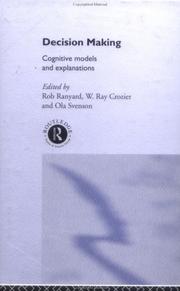
ISBN: 1134726783 1280318457 0203444396 9780203444399 0415158184 9780415158183 9786610318452 661031845X 9781134726738 9781134726776 9781134726783 9780415513593 1134726775 Year: 1997 Publisher: London New York Routledge
Abstract | Keywords | Export | Availability | Bookmark
 Loading...
Loading...Choose an application
- Reference Manager
- EndNote
- RefWorks (Direct export to RefWorks)
This book offers an exciting new collection of recent research on the actual processes that humans use when making decisions in their everyday lives and in business situations.
Decision making. --- Cognition. --- Psychology --- Deciding --- Decision (Psychology) --- Decision analysis --- Decision processes --- Making decisions --- Management --- Management decisions --- Choice (Psychology) --- Problem solving --- Decision making
Periodical
ISSN: 1265499X Year: 1997 Publisher: La Garde, France : Laboratoire I3M, Université du Sud Toulon-Var
Abstract | Keywords | Export | Availability | Bookmark
 Loading...
Loading...Choose an application
- Reference Manager
- EndNote
- RefWorks (Direct export to RefWorks)
Decision making --- Decision support systems --- Information technology --- Management information systems --- Telematics --- Management --- Decision making. --- Decision support systems. --- Management. --- Deciding --- Decision (Psychology) --- Decision analysis --- Decision processes --- Making decisions --- Management decisions --- Choice (Psychology) --- Problem solving
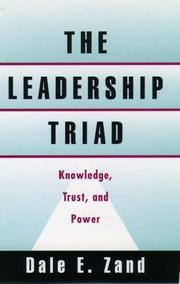
ISBN: 1280527668 0195357817 1429415517 9781429415514 9781280527661 9786610527663 6610527660 0195092406 9780195092400 0197703283 Year: 1997 Publisher: New York Oxford University Press
Abstract | Keywords | Export | Availability | Bookmark
 Loading...
Loading...Choose an application
- Reference Manager
- EndNote
- RefWorks (Direct export to RefWorks)
In this book Zand dispels the mystery surrounding leadership so that managers at all levels can develop the skills needed to lead effectively. Using real examples he shows how managers can succeed or fail.
Leadership. --- Decision making. --- Control (Psychology) --- Trust. --- Trust (Psychology) --- Attitude (Psychology) --- Emotions --- Power (Psychology) --- Psychology --- Senses and sensation --- Deciding --- Decision (Psychology) --- Decision analysis --- Decision processes --- Making decisions --- Management --- Management decisions --- Choice (Psychology) --- Problem solving --- Ability --- Command of troops --- Followership --- Decision making
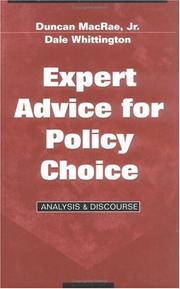
ISBN: 1589013174 058525401X 9780585254012 9781589013179 0878406409 0878406417 9780878406401 9780878406418 Year: 1997 Publisher: Washington, D.C. Georgetown University Press
Abstract | Keywords | Export | Availability | Bookmark
 Loading...
Loading...Choose an application
- Reference Manager
- EndNote
- RefWorks (Direct export to RefWorks)
Policy sciences. --- Decision making. --- Deciding --- Decision (Psychology) --- Decision analysis --- Decision processes --- Making decisions --- Management --- Management decisions --- Choice (Psychology) --- Problem solving --- Policy-making --- Policymaking --- Public policy management --- Decision making --- Policy sciences --- #SBIB:002.IO --- #SBIB:35H411 --- Beleidscyclus: voorbereiding (inclusief planning)
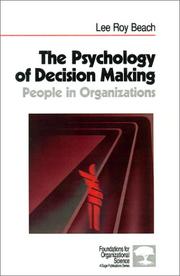
ISBN: 0761900802 0761900799 Year: 1997 Publisher: Thousand Oaks, Calif. Sage
Abstract | Keywords | Export | Availability | Bookmark
 Loading...
Loading...Choose an application
- Reference Manager
- EndNote
- RefWorks (Direct export to RefWorks)
Organization theory --- Decision making --- Organization --- Prise de décision --- Organisation --- #PBIB:1999.2 --- Decision making. --- Organization. --- Arbeids- en organisatiepsychologie --- Besluitvorming --- Organisatieleer --- management --- Besluitvorming. --- Organisatieleer. --- management. --- Management. --- Prise de décision --- Deciding --- Decision (Psychology) --- Decision analysis --- Decision processes --- Making decisions --- Management --- Management decisions --- Choice (Psychology) --- Problem solving
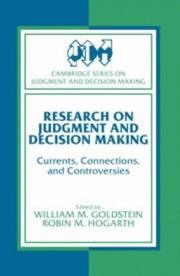
ISBN: 0521483026 0521483344 Year: 1997 Publisher: Cambridge : Cambridge University Press,
Abstract | Keywords | Export | Availability | Bookmark
 Loading...
Loading...Choose an application
- Reference Manager
- EndNote
- RefWorks (Direct export to RefWorks)
Decision making --- Judgment --- Prise de décision --- Jugement --- #SBIB:051.IO --- #SBIB:35H412 --- Judgement --- Knowledge, Theory of --- Language and languages --- Psychology --- Thought and thinking --- Wisdom --- Deciding --- Decision (Psychology) --- Decision analysis --- Decision processes --- Making decisions --- Management --- Management decisions --- Choice (Psychology) --- Problem solving --- Beleidscyclus: vaststelling, besluitvorming --- Decision making. --- Judgment. --- Arbeids- en organisatiepsychologie --- management --- management. --- Management. --- Prise de décision
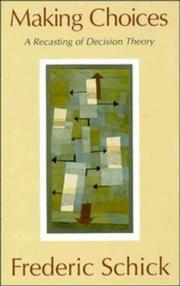
ISBN: 0521581818 0521588405 9780521588409 Year: 1997 Publisher: Cambridge: Cambridge university press,
Abstract | Keywords | Export | Availability | Bookmark
 Loading...
Loading...Choose an application
- Reference Manager
- EndNote
- RefWorks (Direct export to RefWorks)
Decision making --- Reasoning. --- Vagueness (Philosophy) --- Prise de décision --- Raisonnement --- Vague (Philosophie) --- Decision making. --- Prise de décision --- Reasoning --- Argumentation --- Ratiocination --- Deciding --- Decision (Psychology) --- Decision analysis --- Decision processes --- Making decisions --- Management --- Management decisions --- Philosophy --- Reason --- Thought and thinking --- Judgment (Logic) --- Logic --- Choice (Psychology) --- Problem solving
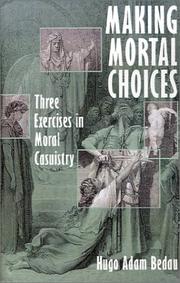
ISBN: 0195108787 0195108779 1280453060 0198026846 0585363897 019985288X Year: 1997 Publisher: New York Haworth
Abstract | Keywords | Export | Availability | Bookmark
 Loading...
Loading...Choose an application
- Reference Manager
- EndNote
- RefWorks (Direct export to RefWorks)
Bedau demonstrates the usefulness of "casuistry", or "the method of cases" in arriving at moral decisions. He examines cases that may compel us to consider questions about who ought to survive when not all can. It seeks to teach something about how we actually reason concerning such life and death situations, as well as about how we ought to reason if we wish both to be consistent and properly respect human life. This book is intended for students and scholars of philosophical ethics. Bedau demonstrates the usefulness of "casuistry", or "the method of cases" in arriving at moral decisions. He examines cases that may compel us to consider questions about who ought to survive when not all can. It seeks to teach something about how we actually reason concerning such life and death situations, as well as about how we ought to reason if we wish both to be consistent and properly respect human life. This book is intended for students and scholars of philosophical ethics. This text examines the usefulness of "casuistry", or "the method of cases" in arriving at moral decisions. It seeks to teach something about how we actually reason concerning life and death situations, and how we ought to reason if we wish both to be consistent and properly respect human life. This text examines the usefulness of "casuistry", or "the method of cases" in arriving at moral decisions. It seeks to teach something about how we actually reason concerning life and death situations, and how we ought to reason if we wish both to be consistent and properly respect human life.
Casuistry. --- Decision making --- Moral and ethical aspects --- Case studies. --- casuïstiek (gevallenstudie, gevalstudie) --- casuistique --- Casuistry --- Deciding --- Decision (Psychology) --- Decision analysis --- Decision processes --- Making decisions --- Management --- Management decisions --- Cases of conscience --- Moral and ethical aspects&delete& --- Case studies --- Choice (Psychology) --- Problem solving --- Christian ethics --- Ethics --- Scholasticism --- Applied ethics
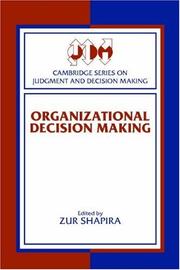
ISBN: 0521481074 0521890500 1107126665 9786612848520 0511788509 0511787782 0511789238 0511785496 0511584164 1282848526 0511786646 9780511789236 6612848529 9780511786648 9781107126664 9781282848528 9780511788505 9780511787782 9780511785498 9780511584169 9780521481076 9780521890502 Year: 1997 Publisher: Cambridge : Cambridge University Press,
Abstract | Keywords | Export | Availability | Bookmark
 Loading...
Loading...Choose an application
- Reference Manager
- EndNote
- RefWorks (Direct export to RefWorks)
Decision making in organizations is often pictured as a coherent and rational process in which alternative interests and perspectives are considered in an orderly manner until the optimal alternative is selected. Yet, as many members of organizations have discovered from their own experience, real decision processes in organizations only seldom fit such a description. This book brings together researchers who focus on cognitive aspects of decision processes, on the one hand, and those who study organizational aspects such as conflict, incentives, power, and ambiguity, on the other. It draws from the tradition of Herbert Simon, who studied organizational decision making's pervasive use of bounded rationality and heuristics of reasoning. These multiple perspectives may further our understanding of organizational decision making. Organizational Decision Making is particularly well suited for students and faculties of business, psychology, and public administration.
Decision making. --- Besluitvorming. --- Organisatieleer. --- Decision making --- Prise de décision --- Health Sciences --- Psychiatry & Psychology --- Deciding --- Decision (Psychology) --- Decision analysis --- Decision processes --- Making decisions --- Management --- Management decisions --- Choice (Psychology) --- Problem solving --- #SBIB:35H302 --- #SBIB:316.334.2A551 --- Organisatieleer: processen --- Partijen en strategieën in de onderneming: ondernemingsbeleid en management
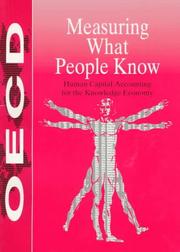
ISBN: 9264147780 9264065482 Year: 1997 Publisher: Paris OECD
Abstract | Keywords | Export | Availability | Bookmark
 Loading...
Loading...Choose an application
- Reference Manager
- EndNote
- RefWorks (Direct export to RefWorks)
A review of innovative policies in OECD countries shows that progress has already been made in moving beyond the poor information provided by standardised educational certification. Spurred by the emerging "knowledge economy", government policy makers, human resource managers, financial accountants and educators are developing methods for systematically evaluating and recording knowledge assets acquired through experience, education and training. This book explains why it is possible, in terms of economic theory, and feasible, from the perspective of accounting practices, to implement new human capital information and decision-making systems.
Personnel management --- -#A9707A --- Decision making. --- Human capital --- Evaluation. --- Decision making --- #A9707A --- Deciding --- Decision (Psychology) --- Decision analysis --- Decision processes --- Making decisions --- Management --- Management decisions --- Choice (Psychology) --- Problem solving --- Human assets --- Human beings --- Human resources --- Capital --- Labor supply --- Evaluation --- Economic value --- Employment --- Education --- Commerce --- Business & Economics --- Accounting
| Listing 1 - 10 of 34 | << page >> |
Sort by
|

 Search
Search Feedback
Feedback About UniCat
About UniCat  Help
Help News
News